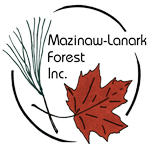Tending
Forest operations carried out to improve the growth or quality of a forest.
Tending may involve cleaning (i.e. the removal of undesirable or competing vegetation through the use of manual or herbicides treatments), thinning, stand improvement or pruning.
- Large majority of tending treatment in the Mazinaw-Lanark Forest is conducted by manual means using brushsaws and chainsaws. The treatment consists of selective removal of competing vegetation (typically poplar, red maple, ironwood, white birch, balsam fir, etc) that inhibits the growth of the desirable regeneration (typically pine, oak, spruce, occasionally sugar maple, basswood, ash, yellow birch) by restricting access to light, moisture, and nutrients.
- Tending provides seasonal employment to a group of contractors with long-term local experience and skills indispensable to properly address complex demands.
- Cleaning refers to tending in the early stage of regeneration development of either natural origin or artificially established (planted).
- Stand Improvement refers to the removal of non-merchantable trees to improve the composition, structure, and quality of a forest stand, generally used in the selection silvicultural system. Normally this treatment is applied in conjunction with logging operation using mechanical harvesting equipment (feller-bunchers) and chainsaws. Consistent with our SEM findings one of the principal species targeted for removal is ironwood but all species are subject of removal based on quality and structural criteria.
- Pre-commercial thinning has very similar objectives and operational characteristics to Stand Improvement but the term is typically applied to the even-aged silvicultural system and may involve additional component of the release and spacing of future crop trees.
- Chemical tending is rarely used for the release of desirable regeneration. In addition to the concerns listed in the SIP section, the seasonally variable sensitivity of our common crop species (white pine, red pine, oak, several hardwoods) and relative insensitivity of some key competitors (blackberry, red maple, balsam fir) to low doses of herbicides limits the number of sites where chemical tending is a viable option.
